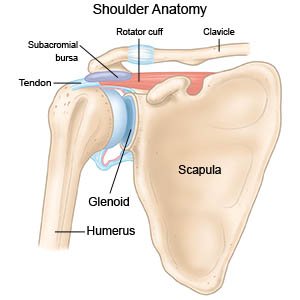Shoulder Impingement Syndrome
Medically reviewed by Drugs.com. Last updated on Aug 4, 2025.
The most common type of shoulder impingement syndrome is subacromial impingement syndrome (SIS). SIS happens when the tendons or bursa become trapped between bones of your shoulder joint. You have pain when you reach over your head or lie on the shoulder while sleeping. You may also have pain when you move your arm out to the side or behind your body.
 |
DISCHARGE INSTRUCTIONS:
Return to the emergency department if:
- Your shoulder, arm, hand, or fingers turn bluish or pale, or feel cold or numb.
- Your pain gets worse, even after rest and medicine.
- You cannot move your fingers.
Call your doctor if:
- You have questions or concerns about your condition or care.
Related medications
Medicines:
You may be given any of the following:
- Acetaminophen decreases pain. It is available without a doctor's order. Ask how much to take and how often to take it. Follow directions. Read the labels of all other medicines you are using to see if they also contain acetaminophen, or ask your doctor or pharmacist. Acetaminophen can cause liver damage if not taken correctly.
- NSAIDs, such as ibuprofen, help decrease swelling and pain. This medicine is available with or without a doctor's order. NSAIDs can cause stomach bleeding or kidney problems in certain people. If you take blood thinner medicine, always ask your healthcare provider if NSAIDs are safe for you. Always read the medicine label and follow directions.
- Take your medicine as directed. Contact your healthcare provider if you think your medicine is not helping or if you have side effects. Tell your provider if you are allergic to any medicine. Keep a list of the medicines, vitamins, and herbs you take. Include the amounts, and when and why you take them. Bring the list or the pill bottles to follow-up visits. Carry your medicine list with you in case of an emergency.
Rest
will help your shoulder pain. Limit reaching above your shoulder's height.
Apply ice
on your shoulder for 20 minutes 1 or 2 times in a day. Use an ice pack, or put crushed ice in a plastic bag. You may also use a bag of frozen peas or corn. Cover the bag with a towel. Ice decreases swelling and pain.
Follow up with your doctor and physical therapist as directed:
Write down your questions so you remember to ask them during your visits.
© Copyright Merative 2025 Information is for End User's use only and may not be sold, redistributed or otherwise used for commercial purposes.
The above information is an educational aid only. It is not intended as medical advice for individual conditions or treatments. Talk to your doctor, nurse or pharmacist before following any medical regimen to see if it is safe and effective for you.
Further information
Always consult your healthcare provider to ensure the information displayed on this page applies to your personal circumstances.
